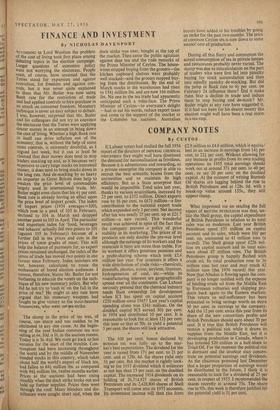COMPANY NOTES
By CUSTOS
If Labour voters had studied the full 1954 report of the directors of IMPERIAL CHEMICAL INDUSTRIES they might well have dismissed the demand for nationalisation as frivolous. Because it is adventurous and rewarding, as a private enterprise the company is able to recruit the best scientific brains from the universities and so maintain its high efficiency. But as a State enterprise that would be impossible. Total sales last year, thanks to various acquisitions, increased by 25 per cent. to £352 million. Direct exports rose by 16 per cent. to £675 million—a fine contribution to the national export trade which expanded only 3 per cent. Net income after tax was nearly 25 per cent. up at £21.7 million—a new record. This wonderful result was achieved in spite of the fact that the company pursues a policy of price stability in its marketing. The prices of its products are only double the pre-war level although the earnings of its workers and the materials it buys are more,than treble. For its workers it offers generous pensions and a profit-sharing scheme which took £2.6 million last year. For investors it offers a wide distribution of trade risks—chemicals, dyestuffs, plastics, nylon, terylene, titanium, hydrogenation of coal, etc.—while its manufacturing interests are geographically spread over all the continents. Can Labour seriously pretend that the chemical industry needs State ownership for development when ICI has spent on capital account £258 million since 1945? Last year's capital spending alone was £344 million. On the doubled capital ICI earned 304 per cent. in 1954 and distributed 10 per cent. It is reasonable to look for at least 124 per cent. this year so that at 50s. to yield a potential 5 per cent, the shares still look attractive.
The 100 per cent. bonus declared by BURMAH OIL was fully up to the mar- ket's best expectations. The dividend for the year is raised from 174 per cent. to 21 per cent. and at 128s. 6d. the shares yield only 35 per cent. But the market is rightly look- ing to the 1955 dividend which it estimates at not less than 15 per cent. on the doubled capital. The increased 1954 dividends on its holding of 26,714,925 shares of British Petroleum and its 2,428,800 shares of Shell Transport will come into its 1955 accounts. Its investment income will then rise from
£2.9 million to £4.6 million, which is equiva) lent to an increase in earnings from 141 per cent. to 224 per cent. Without allowing for any increase in profits from its own trading operations its 1955 total ,earnings should work out at around 375 per cent. to 40 per cent., or say 20 per cent. on the doubled capital. At the moment of writing Burmah Oil shares are lagging behind the rise in British Petroleum and at 128s. 6d. with a break-up value around 155s., they still appear cheap.


































 Previous page
Previous page